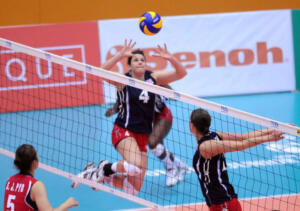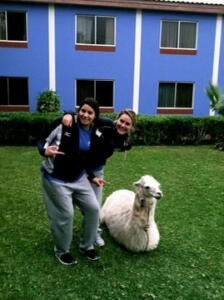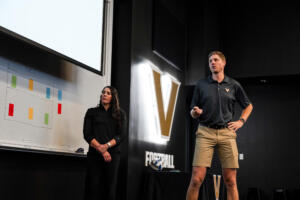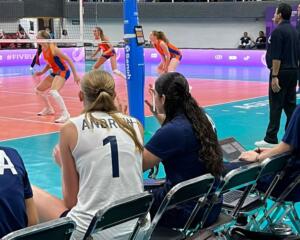Coming Full Circle
by Graham HaysTwelve years after representing her country on the volleyball court, Vanderbilt’s Lauren Plum blazed a new trail as a Team USA assistant coach in the FIVB U21 World Championship
NASHVILLE, Tenn. — The longest match of the 2023 FIVB Under-21 World Championship was surely also one of the loudest. There were no medals on the line; the two teams were playing only for pride. But for a full five sets, the United States and tournament host Mexico traded points and momentum. The partisan crowd of several thousand fans in the northern city of León lent the event an atmosphere reminiscent of bigger stages—the sort of stage the high schoolers who made up the bulk of the American roster dreamed of playing on in the Olympics or the Final Four.
To Vanderbilt assistant coach Lauren Plum, who was coaching with that U.S. team, the din was music to a competitor’s ears as the Americans sweated out a 23-25, 25-21, 27-25, 24-26, 15-11 win.
“One of the best experiences you can have as an athlete is playing the home country, in their country, regardless of the level,” Plum said. “Those players are always going to show out for their country. We had no business going to five sets with Mexico, but they played out of their minds. They wouldn’t go away. Our girls are so much bigger, but the Mexican players are digging everything. Our girls were so frustrated, looking at us like, ‘What do we do?’”
Plum was particularly well equipped to answer. Just 12 years earlier, in front of an even bigger and no less boisterous home crowd in Lima, Peru, Plum was on the court for an American team that lost a five-set marathon against the host during the same biennial event. Though the result left it difficult to enjoy in the moment, she looks back fondly on her South American adventure. So, in León, she advised players to feed off the crowd’s energy, tune out any negativity and play their own brand of volleyball. Win or lose, they would remember the experience forever.
Only a few years removed from her own playing career, Plum’s opportunity to coach a U.S. team in a major international event represents a remarkably quick ascent in her new line of work. Her colleagues were head coach Tom Hogan, who helped lead the U.S. to a silver medal in the 2008 Olympics, and Stacy Sykora, a three-time Olympian and member of that 2008 team. Plum, by contrast, was in high school in 2008, still several years shy of All-America honors at the University of Oregon and a professional career in France, Germany and Puerto Rico.
 In returning to the U21 World Championship, this time as a coach, Plum came full circle. But rather than a closed loop, her path propelled her onward—like a spacecraft riding the gravitational slingshot of planetary orbit. The end of one story, the trip to Mexico was also the beginning of the next story. A story in which Plum is again a rising star, and her ascent is a blueprint for a nascent Vanderbilt program eager to be on the big stage as soon as possible.
In returning to the U21 World Championship, this time as a coach, Plum came full circle. But rather than a closed loop, her path propelled her onward—like a spacecraft riding the gravitational slingshot of planetary orbit. The end of one story, the trip to Mexico was also the beginning of the next story. A story in which Plum is again a rising star, and her ascent is a blueprint for a nascent Vanderbilt program eager to be on the big stage as soon as possible.
“One of the reasons I hired Lauren was because I knew she’d be such a great role model for future student athletes—in her competitiveness, demeanor and professionalism, but also in what she’s done in her career as a volleyball player,” Vanderbilt head coach Anders Nelson said. “Lauren played for a junior national team and now has coached with one. What a cool thing to say. There can’t be many people that have done both of those things.
“It just gets me so excited for future student-athletes who are going to get the chance to be coached by somebody who has that passion for volleyball, but also that passion for experiencing life, growing and getting work done.”
The road to Nashville
Mexico aside, Plum has long gone wherever the game leads her. It’s something of a family tradition. While her younger sister, Kelsey, is WNBA royalty, volleyball was at least as much of a family game as they were growing up in the San Diego area. Her mother and older sister, Kaitlyn, played collegiately at UC–Davis. Plum tried other sports. She was particularly fond of basketball and its physicality, simulating the rough-and-tumble sibling battles that regularly broke out at home. But like her mom and older sister, she eventually gravitated to the volleyball court.
“It was the speed of the game that made it so fun,” Plum said. “It was so hard to master volleyball, and so it kept me really, really hungry. To this day, I don’t think I’ve ever walked out of a game feeling like I played perfectly. There are so many skills. And to do it right every time, feels like it’s actually impossible. The sport keeps you humble.”
 By the time she traveled to Peru and mingled with llamas as a member of the 2011 U20 team, she was one to watch. She had already earned all-conference freshman honors while starting every match at Oregon. By her junior year, she was a first-team All-American and the Pac-12 Setter of the Year. She finished her time in Eugene as the program’s all-time leader in assists.
By the time she traveled to Peru and mingled with llamas as a member of the 2011 U20 team, she was one to watch. She had already earned all-conference freshman honors while starting every match at Oregon. By her junior year, she was a first-team All-American and the Pac-12 Setter of the Year. She finished her time in Eugene as the program’s all-time leader in assists.
With no domestic professional league available to athletes, she again followed the game across borders to play in France, Germany and Puerto Rico over the next six years. Only the onset of the COVID-19 pandemic in 2020 forced her off the court—but not out of the game. With leagues across the world shuttered, she ventured into coaching as an assistant at Villanova.
She thought the transition might be temporary, that she might again pack her bags when leagues resumed. But all those years at the top of the sport had taken their toll. She played on two partially torn Achilles, always wondering if the next match would be one too many. She still needs shoulder surgery to repair a career’s worth of wear and tear. Those were only the physical aches. Playing overseas offers unforgettable opportunities to explore and learn, but it can also be a solitary existence. Communication is easier in this day and age, but time zones are still time zones and loved ones still distant. Your teammates try to include you, but it’s difficult to be a part of the locker-room banter and fire off one-liners in a language that’s not your own.
And coaching turned out to be even more rewarding than she anticipated. She moved on to Arizona, gaining even more experience in recruiting and then spent a season at Notre Dame, going all in on scouting and film study, among other duties. As ever, she went wherever the opportunity to improve took her—which is how she found her way to Nashville. There were more conventional paths up the career ladder, but an opportunity to work with Nelson, a rising star in his own right who was building a program from the ground up in the SEC? That was an opportunity and a challenge that a world-class competitor couldn’t resist.
All in on a new ambition
That’s where she was this spring, when USA Volleyball reached out about an opening on the U21 coaching staff. Vanderbilt won’t play an official match until 2025, but even as their peers return to the court this fall, few coaching staffs anywhere in the country have been busier than Nelson, Plum and Russell Corbelli. They aren’t just cleaning house, they’ve started from scratch, so they’re proverbially clearing the land, putting in the foundation, laying each brick and furnishing it—all to make it a welcoming and productive home by the time their first recruits arrived next fall.
Taking several weeks out of that work to coach the U21 team was a sacrifice—for her and her Vanderbilt colleagues—but Nelson never hesitated in encouraging her to seize the opportunity.

Plum and head coach Anders Nelson, right, conducting a volleyball lunch-and-learn seminar.
In mid-August, Plum traveled to Anaheim, California, for a short camp at the National Team Training Center. There, at home base for the senior men’s and women’s national teams, the youngsters had the opportunity to train alongside the women’s team building toward next summer’s Paris Olympics under head coach and volleyball legend Karch Kiraly.
For Plum, Anaheim was bittersweet. She played alongside or against many current members of the national team. She dreamed of her own Olympic opportunity. But setters compete for some of the scarcest spots on a national team roster. Plum was an Olympic-caliber talent, but there are more of those in this country than there are Olympic roster spots. She never found her fit in the system the U.S. employed under Kiraly.
August marked her first return to that environment since missing the 2020 Olympic team, part of a final chapter as a player that, along with the pandemic and injuries, fell short of Hollywood.
But as the U21 team began to train, welcoming several members of the U19 team fresh off the plane from Croatia after winning a world title in that age group, future opportunities pushed past regrets into the background. However Plum’s playing career had ended, she seized control of her next chapter. Her presence in Anaheim is proof that she emerged in just a few years as coach with world-class potential. Here was her opportunity to help the next generation not just chase Olympic dreams, but find the balance and perspective to pursue all their dreams.
“I definitely feel like I didn’t finish my career exactly how I would want to—but I’m very open talking about that because I don’t think the world’s perfect,” Plum said. “I think these things happen for a reason. What I can do is help the next generation not take this crazy long path to success or happiness or whatever. I always joke with them: ‘Hey, I sunk so you can float.’
“I’m an open book. I can help them grow in moments where I feel like I either didn’t have anyone to talk to or was way too prideful to ask for help.”
Coach Plum in Mexico
Playing in front of a hostile home crowd wasn’t the only familiar experience Plum encountered in Mexico. During a pool play match in Aguascalientes, rain outside revealed the extent of a leak in the roof right above the court. With the match paused, Plum couldn’t help but laugh, thinking back to a match in Lima, Peru, during the 2011 tournament when water that had pooled on the facility’s roof broke through and cascaded like a waterfall.
It could be worse, she assured present-day players who were puzzled by her obvious amusement. In her playing days, she told them, almost as soon as officials and players dried the court and restarted the match, birds forced another delay by relieving themselves on the court.
Then, once the match resumed in Mexico, the players discovered that birds, perhaps startled from the rafters by the leak, had repeated history in full on the other side of the court.
The younger generation marveled at their coach’s power of prophecy.
“It was really cool to see the parallels of what I had been through 12 years before and be able to turn it into a fun moment for our players,” Plum chuckled. “It really is a circle of life, to see how they reacted and know that was me 12 years ago.”

Plum lending her experience in Mexico (courtesy Lauren Plum).
She tried to lend her expertise whenever she could. USA Volleyball gear is always highly prized in the souvenir swap meet that springs to life among athletes from different teams during international tournaments. Ever the competitor, Plum met with only modest success in getting her players to drive a hard bargain.
She was more successful in conveying the more meaningful lessons available through international competition. Even if it meant long days and late nights for her and the other coaches studying opponents in person and on film, the American team could be ready for just about anything encountered on the court. But part of going to a tournament, whether a world championship, Olympics, NCAA Tournament or any other, is adjusting to the unexpected. It’s difficult, for instance, to plan for a hotel restaurant closing early, leaving coaches to prepare peanut butter and jelly sandwiches for hungry athletes after a late-night match.
How athletes react when plans go awry and routines are interrupted informs how they react in moments of competitive adversity, such as when a supposedly overmatched Mexican team digs every ball in sight. And how they react to competitive adversity, in turn, shapes how they respond to adversity encountered elsewhere in life.
Sometimes a teaching moment presents itself through as unlikely an instrument as a PB&J.
Plum was always good at adapting, at shrugging off a leaky roof or ad-lib meal and carrying on. By her own admission, she wasn’t always great at communicating the stresses that life’s adversities bring. As a coach, she wants to help the next generation master both responses. Adapt and control what is within your control. Don’t be afraid to reach out for help with the rest. It’s the philosophy underpinning Nelson’s “shatter your ceilings” mantra at Vanderbilt, a belief that developing the whole person isn’t just possible alongside athletic development but is a blueprint for championships.
“No one likes someone who is up on their high horse saying, ‘Just don’t be anxious,’” Plum said. “Guess what? Everyone gets anxious. But did you control what you can control? If not, OK, that’s what we need to tackle. That’s what you need to put your energy and effort into, instead of only thinking about how anxious you are or how unfair the situation is.”

Team USA during the U21 World Championship (courtesy Lauren Plum).
Young even by the standards of the event, many playing up an age group and some in their second world championship in a matter of weeks, the Americans ultimately finished sixth. But they had their moments, defeating the Netherlands in a must-win match to advance from a devilishly tricky opening group and later outlasting Mexico in the five-setter.
They will remember the successes and the disappointments, just as they remember swapping souvenirs with peers from around the world. They will remember the ad-lib meals, leaky roofs and countless other stories that grow more fondly recalled with each passing year.
Plum knows this because she lived it. She’s walked the road those athletes now travel. She’s ready to be a guide—for a young American team in Mexico and for a group of young women who will arrive in Nashville next fall to help build something.
“There were so many little things of them not having the experience to see the bigger picture,” Plum reflected on her time in Mexico. “I know they enjoyed it while it was happening, but you don’t really enjoy it until after you’re done with it and you look back years later.
“It’s only then that you’re like, ‘Wow, that was really something special.’”
She’s come full circle, but her journey is far from finished.

